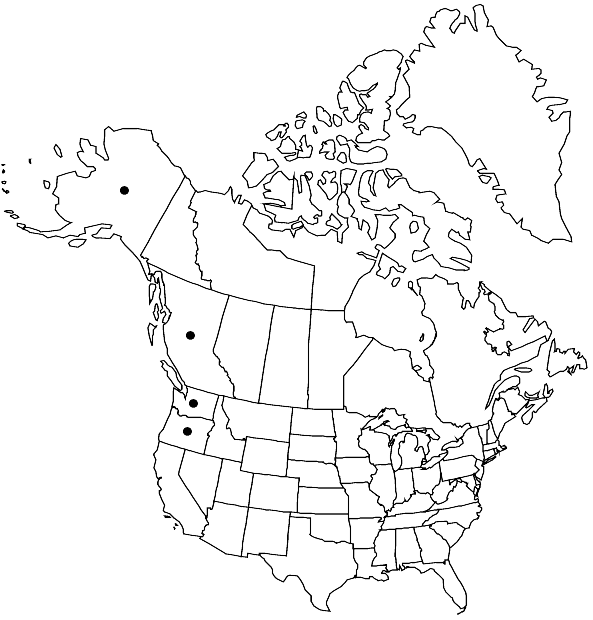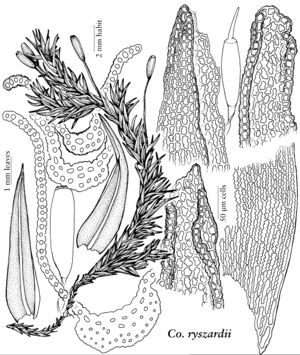Codriophorus ryszardii
in R. Ochyra et al., Cens. Cat. Polish Mosses, 141. 2003,.
Plants medium-sized to large, in loose, extensive tufts or mats, dull, green, yellow-brownish or olive to green-brown. Stems (1–)2–7 cm or occasionally up to 10 cm long, prostrate to ascending, irregularly sparsely branched, usually radiculose at base. Leaves lanceolate to linear-lanceolate, (2.8–)3.2–4.0(–4.2) × 0.8–1(–1.1) mm; margins 1-stratose throughout, recurved on both sides to about 3/4–7/8 of way up the leaf; apices slenderly long acuminate, obtuse to subacute, irregularly bluntly erose-dentate, cristate to papillose-crenulate, rarely entire at the extreme apex; costa subpercurrent, (80–)90–120(–135) µm wide; laminal cells 1-stratose throughout. Seta brown, (4.5–)5.5–7.5(–9) mm. Capsule brown, cylindric, (2–)2.3–3(–3.2) mm, smooth; peristome teeth 500–650 µm, dark yellow to orange-brown, regularly 2-fid to the base, densely papillose with tall, spiculose papillae. Spores 10–16 µm.
Habitat: Moist or wet, seldom dry, shaded or exposed granite, basalt and sandstone, rarely limestone rock outcrops, boulders and cliff faces in stream beds and on stream or lake banks throughout the coastal coniferous forest
Elevation: low to high elevations (0-2200 m)
Distribution

B.C., Alaska, Oreg., Wash.
Discussion
Codriophorus ryszardii ranges from Kodiak Island southwards to the Olympic Mountains and Cascade Range of Washington and northern Oregon. The species was recognized as a distinct taxon only recently by Bednarek-Ochyra, who showed that the western North American specimens determined as Racomitrium aquaticum (Schrader) Bridel (W. B. Schofield 1968, 1976; E. Lawton 1971) had nothing to do with that European endemic and represented a new species. Although there are some similarities in the structure of the costa, C. ryszardii is immediately distinct in having lanceolate to linear-lanceolate leaves, 3.2–4 mm. They are narrowly long acuminate and end with an obtuse or subacute apex that is most often bluntly erose-dentate, giving it a cristate appearance, and only seldom is the leaf apex entire. Moreover, its leaf margins are recurved to 3/4–7/8 of the leaf length, costae are often bluntly winged abaxially in the distal portion, laminal cells are entirely 1-stratose, and the supra-alar cells are not differentiated from the adjacent laminal cells and do not form basal marginal borders. Additionally, the peristome teeth are longer, 500–650 µm, and they are densely papillose with needle-like papillae. The leaves of C. aquaticus are shorter, 2.5–3 mm, broadly lanceolate and more shortly acuminate into an obtuse and always entire, never erose-dentate or cristate apex. Moreover, the leaf margins are recurved to 1/2–3/4 of the leaf length, costae are symmetric and never winged abaxially, laminal cells are sometimes 2-stratose distally, the supra-alar cells are quadrate to short-rectangular with relatively thick, smooth to slightly sinuose walls forming short but usually distinct, hyaline to yellowish-hyaline but otherwise pellucid marginal borders, and the peristome teeth are shorter, to 450 µm, and they are only finely papillose.
Selected References
None.
